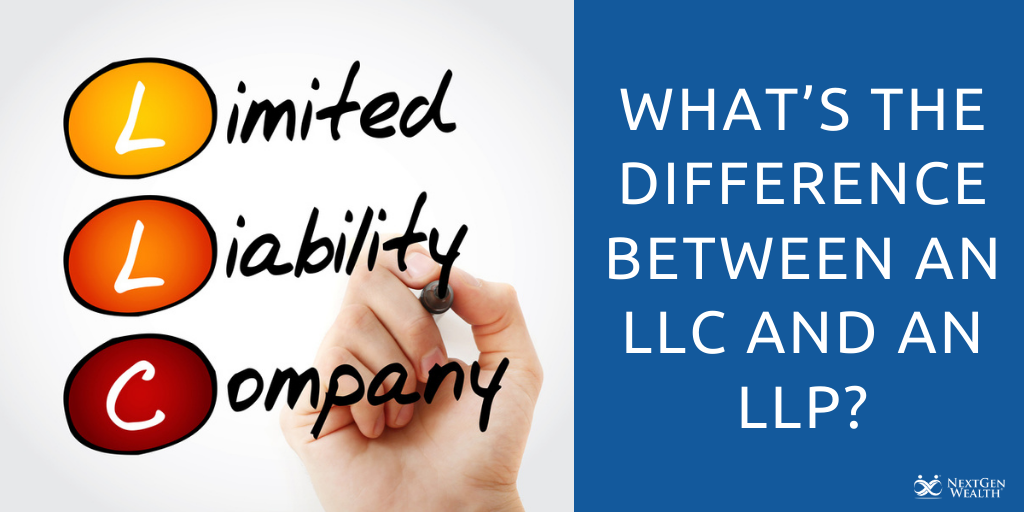What’s the Difference Between an LLC and an LLP?
If you are considering starting or investing in a new business, you may have seen some information on a limited liability company (LLC) and a limited liability partnership (LLP). When you first look at the two business structures, they look very similar, but there are some key differences between an LLC and an LLP. 
To hopefully decrease confusion, we’ll start with defining what they are and then dive into what makes them different.
What Exactly is a Limited Liability Company (LLC)?
A limited liability company (LLC) is a business structure that gets a corporation’s limited liability protection and the tax benefits of a partnership. LLC owners are known as “members” (not partners or shareholders) and can be individuals, corporations, S corporations, other LLCs, trusts, and/or pension plans.
Each state has its own laws regarding the formation of LLCs. Some businesses can’t be formed as an LLC. As such, it is in your best interest to seek advice from a professional who is well-versed in the specific laws of a given state.
What is a Limited Liability Partnership (LLP)?
A limited liability partnership (LLP) is a business structure that allows its owners to benefit from some liability protection, get possible tax breaks and enjoy some other advantages. Professionals such as attorneys, accountants and doctors often utilize this structure when they practice together. Like the LLC, an LLP gets some of the benefits of a corporation as well as those of a partnership.
This hybrid business structure is created by two or more owners known as “partners.” One key difference is that an LLP needs a managing partner that will be liable for the actions that the partnership takes. Other types of partners such as silent partners and investors will receive liability protection so long as they do not take a managerial role.
Like an LLC, each state has different laws about forming an LLP, and some professions are not allowed to form an LLP. Seeking the help of a professional who is familiar with the laws of the state you want to operate in will help you safely establish the business you wish to run.
Differences in Management Structure
The way an LLC and an LLP determine the management structure for the business is another big difference. Members of an LLC may manage the business themselves as a member-managed LLC. Another option is that they may instead hire a member, members or even non-members to run the business.
An LLC’s members may create an operating agreement that outlines financial and working relationships for the members. Many operating agreements have the following:
- each member’s percentage of ownership of each member
- each member’s share of profits/losses
- each member’s responsibilities and rights in the LLC
- an outline for what happens if a member leaves the business, passes away or becomes disabled
- rules to run meetings and votes
- a procedure for buying and selling a member’s percentage interest
In an LLP, the partnership agreement determines the management structure, similar to the operating agreement. One term you may have heard is a “silent partner,” a partner who gets a share of the profits but does not participate in making decisions for the business. The partnership agreements usually cover the following:
- The name of the partnership
- What contributions each partner will make
- How partnership decision-making is handled
- How to handle disputes
- How management duties will be divided
- How profits and losses are allocated
- How to admit new partners
- How to deal with partner buyouts and death
Differences in Limited Liability Protection
An LLC and an LLP reduce each member’s or partner’s, respectively, liability to the amount they invested in the company, which gives some protection against personal liability.
With an LLC, members receive the most liability protection. Barring cases of business mismanagement, if a lawsuit is filed against the LLC or any debt is owed, members are not personally responsible. To elaborate, the members’ liability is limited to how much you invested in the company and not your other personal assets, such as vehicles, property or even that emergency fund you have been growing.
Similarly, LLP partners have limited liability; however, this varies from state to state. Depending on the state, partners in an LLP might be responsible for their own acts of negligence and not the negligence of other partners. Moreover, the law in other states might require one partner to have unlimited personal liability, thus protecting the other partners.
Differences in Taxation
The Internal Revenue Service (IRS) does not recognize LLCs and LLPs as business entities. As a result, neither has to pay income taxes, but the IRS requires both to file an informational tax return.
An LLC chooses to file taxes as a partnership, a corporation, or a sole proprietorship, whereas an LLP can only file as a partnership. When filing as a partnership or a sole proprietor (when there is only one LLC member), income passes through a business, and the individual pays taxes only one time as the individual’s income. When filing as a corporation, the business pays taxes on its corporate tax return, and then that same income is taxed again on the individual’s personal tax return.
LLCs and LLPs enjoy a 20% pass-through deduction. It has limitations, but this tax break allows you the opportunity to deduct up to 20% of the business profits from your personal tax return. Different states have different laws regarding taxes, and what may be legal for an LLC in one state may be quite different for that same LLC if it were to operate in another state.
Deciding the Correct Business Structure for You
The two business structures have a lot in common, but hopefully, you are now better informed on the differences between an LLC and an LLP. It is easy to draw up the paperwork to form either one, but it is crucial to choose the correct one to protect your new business from being blindsided by legal issues or tax problems.
You may want to read further about the advantages and disadvantages of each. Seek the help of legal professionals to help you choose which is best for your state.


